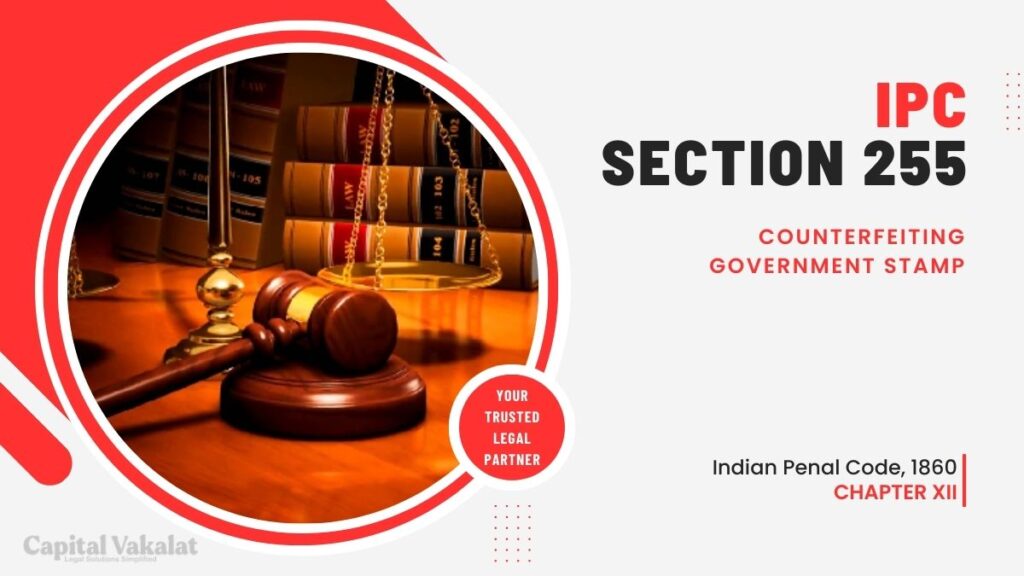In the realm of law and justice, there exists a provision that meticulously tackles one of the most intriguing yet critical aspects of counterfeiting – the counterfeiting of government stamps. This deceptive practice not only undermines the financial integrity of governments but also poses a significant threat to the overall trust in official documents and transactions.
Section 255 of the Indian Penal Code (IPC) deals comprehensively with the offense of counterfeiting government stamps, shedding light on the legal aspects, consequences, and the mechanisms to thwart such illicit activities.

In this article, we will delve deep into Section 255 IPC, exploring its nuances and implications while deciphering the gravity of counterfeiting government stamps.
Introduction
Counterfeiting government stamps, a clandestine practice, poses a grave threat to the functioning of a nation. Such actions not only breach the law but also have far-reaching consequences for the economy, administration, and society as a whole. In this article, we will navigate through Section 255 of the IPC, dissecting its provisions and ramifications.
Understanding Government Stamps
Government stamps are a fundamental aspect of the legal and financial systems of any nation. They are utilized in a myriad of transactions, including property sales, contracts, and legal documents. These stamps carry a financial value and are indicative of the payment of fees or taxes to the government. Counterfeiting these stamps involves creating imitation or forged versions, which are then fraudulently used in transactions.
Section 255 IPC: The Legal Framework
Section 255 of the Indian Penal Code is the cornerstone in addressing the issue of counterfeiting government stamps. This section pertains to the counterfeiting of government stamps and carries severe penalties for those found guilty.
Elements of Offense
To be charged under Section 255 IPC, certain elements must be established. These include the intent to counterfeit government stamps, possession of counterfeit stamps, and fraudulent use of these counterfeit stamps.
Punishments for Counterfeiting Government Stamps
The legal consequences for counterfeiting government stamps are substantial. Those convicted may face imprisonment, fines, or both, depending on the gravity of the offense. The severity of the punishment acts as a deterrent for potential counterfeiters.
Prosecution and Investigations
The legal system follows a diligent process in prosecuting individuals accused of counterfeiting government stamps. This often involves detailed investigations and the presentation of evidence in a court of law.
Preventive Measures
Preventing counterfeiting is crucial. Governments employ various security features in their stamps to make counterfeiting difficult. Awareness and education are also essential tools in the fight against counterfeiters.
Notable Cases
Throughout history, there have been several significant cases of counterfeiting government stamps that have garnered attention. These cases serve as cautionary tales and illustrate the gravity of the offense.
Impact on Society
The consequences of counterfeiting government stamps ripple through society. It erodes trust in the legal system, impacts financial transactions, and can lead to economic losses for the government and citizens alike.
Conclusion
In conclusion, Section 255 IPC plays a pivotal role in combating the counterfeiting of government stamps. This legal provision serves as a deterrent and a means of redress for those affected by such deceptive practices. The counterfeiting of government stamps is not just a crime against the law but also a breach of trust that affects the entire fabric of society.
In this article, we have unraveled the complexities of Section 255 IPC, shedding light on the offense of counterfeiting government stamps. The legal provisions and their implications make it clear that this is a matter of utmost importance in maintaining the integrity of financial and legal systems within a nation.
Frequently Asked Questions
How does Section 255 IPC address counterfeiting government stamps?
Section 255 IPC provides the legal framework for dealing with the offense of counterfeiting government stamps, specifying punishments and procedures.
What are the penalties for counterfeiting government stamps under Section 255 IPC?
The penalties for counterfeiting government stamps may include imprisonment, fines, or both, depending on the seriousness of the offense.
How can government stamps be made more secure to prevent counterfeiting?
Governments employ security features like holograms, watermarks, and special inks to make their stamps harder to counterfeit.
What is the societal impact of counterfeiting government stamps?
Counterfeiting government stamps erodes trust in the legal system, affects financial transactions, and can lead to economic losses, impacting society as a whole.